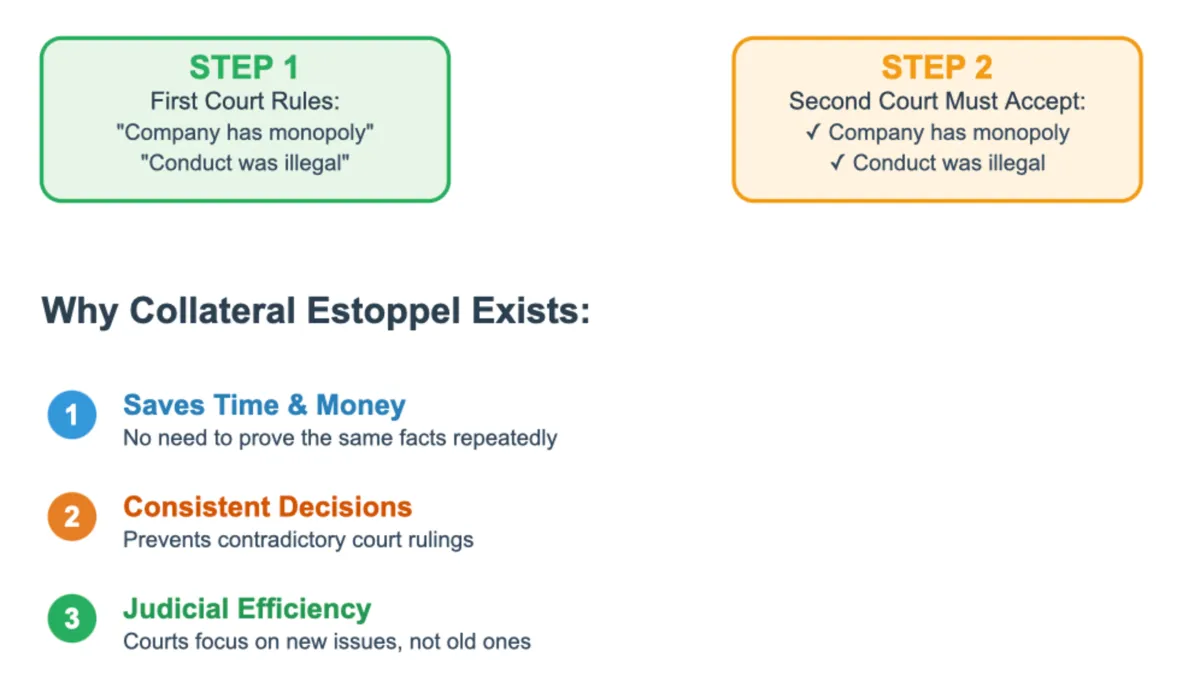
OpenX Technologies has filed a comprehensive antitrust lawsuit against Google, seeking substantial damages following the Eastern District of Virginia court's landmark ruling that found Google illegally monopolized digital advertising markets. The complaint, filed today, represents the latest private action to emerge after the Department of Justice's successful prosecution of Google's ad tech monopoly.
The lawsuit details how Google's systematic anticompetitive conduct destroyed OpenX's innovative ad server business and severely damaged its ad exchange operations through what the court previously characterized as "willful" monopolization. OpenX alleges that Google's tying arrangements, auction manipulation, and targeted attacks through "Project Poirot" violated federal antitrust laws and caused hundreds of millions in damages.
Subscribe the PPC Land newsletter ✉️ for similar stories like this one. Receive the news every day in your inbox. Free of ads. 10 USD per year.
According to the 87-page complaint, OpenX was a pioneer in digital advertising innovation, introducing real-time bidding technology in 2009 and developing header bidding in 2013. The company held several patents related to these revolutionary technologies that improved market efficiency for both publishers and advertisers.
Google's systematic elimination of competition
The complaint describes Google's "three pillar" strategy following its 2008 acquisition of DoubleClick: requiring use of its publisher ad server platform to access desired inventory, using its ad exchange to aggregate that inventory, and forcing advertisers on Google Content Network to monetize inventory exclusively via Google's ad exchange.
This strategy created what Google internal documents acknowledged as a conflict of interest, with one employee comparing it to "if Goldman or Citibank owned the NYSE [New York Stock Exchange]".
The Eastern District of Virginia court found in April 2025 that Google violated antitrust law by "willfully acquiring and maintaining monopoly power" in publisher ad servers and ad exchanges for open-web display advertising. The court determined that Google's tying of real-time bids from AdX to the use of DFP was unlawful, and that Google's Dynamic Allocation, Last Look, Sell-Side Dynamic Revenue Share, and Unified Pricing Rules were all anticompetitive.
 PPC LandLuis Rijo
PPC LandLuis Rijo
Technical manipulation of advertising auctions
OpenX's complaint reveals sophisticated technical manipulation by Google to maintain its dominance. The company implemented Dynamic Allocation, which gave AdX an exclusive "First Look" at all inventory flowing through DFP, allowing it to cherry pick the most valuable ad requests before other exchanges could compete.
After OpenX introduced header bidding technology to level the playing field, Google responded with Last Look, which allowed AdX to see the winning bids from header bidding auctions and bid just enough to win, effectively manipulating auction outcomes.
The complaint details Google's secret "Project Poirot" program, launched in 2017, which systematically reduced bids from Google's DV360 demand-side platform into competing ad exchanges by up to 90%, while ensuring AdX was exempted from such reductions. Internal Google documents revealed the program's goal was to "dry out" header bidding and shift demand back to AdX.
 PPC LandLuis Rijo
PPC LandLuis Rijo
Devastating impact on OpenX operations
The cumulative effect of Google's conduct proved devastating for OpenX. The company was forced to undergo two rounds of layoffs between October 2018 and March 2019, terminating 210 employees representing nearly 50% of its workforce. OpenX ultimately shut down its ad server business entirely in 2019 due to Google's anticompetitive restrictions.
The complaint documents how Project Poirot reduced DV360 spend on the OpenX Ad Exchange by 30% when first introduced in 2017, and by 40% year-over-year by December 2018 after the launch of Poirot 2.0.
Similarities to Gannett's claims
OpenX's lawsuit bears striking similarities to the successful claims advanced by Gannett and other publishers in the multidistrict litigation. Both cases challenge the same core anticompetitive conduct: Google's tying arrangements that forced publishers to use DFP to access AdX real-time bids, Dynamic Allocation's preferential treatment of AdX, and manipulation of auction mechanics.
The March 2024 ruling in the multidistrict litigation granted partial motions to dismiss but allowed publishers to proceed with claims related to Minimum Bid to Win (MBW), finding that publishers "plausibly alleged a violation of section 2" based on Google's use of monopoly power in ad servers to compile bidding data and manipulate auction outcomes.
Similar to Gannett's successful claims, OpenX alleges that Google's conduct "serves no legitimate or pro-competitive purpose that could justify its anticompetitive effects" and violated Section 2 of the Sherman Act.
 PPC LandLuis Rijo
PPC LandLuis Rijo
Industry context and market significance
The digital advertising industry processes billions of transactions daily, with revenue exceeding $200 billion annually in the United States alone. Google maintained market shares between 91-93.5% in publisher ad servers worldwide and 63-71% in ad exchanges between 2018-2022, according to the court's findings.
PPC Land has extensively covered the evolution of advertising technology and the challenges faced by independent ad tech companies competing against Google's integrated stack. The platform has documented how header bidding emerged as a critical innovation to counter Google's auction manipulation, with OpenX playing a pioneering role in its development.
Legal precedent and follow-on actions
The April 2025 court ruling established crucial legal precedent by definitively finding Google's conduct anticompetitive. The decision stated that Google "harmed Google's publishing customers, the competitive process, and, ultimately, consumers of information on the open web".
OpenX's follow-on lawsuit seeks treble damages under federal antitrust law, injunctive relief to prevent continued anticompetitive conduct, and restoration of competitive conditions in advertising technology markets. The complaint requests monetary relief for "compensatory, consequential and punitive damages" as well as "costs of suit, including attorneys' fees".
The case proceeds against the backdrop of ongoing remedies proceedings in the government's antitrust action. Industry observers expect the Department of Justice to seek structural remedies that could force Google to divest portions of its ad tech business, potentially creating opportunities for independent companies like OpenX to rebuild their market positions.
Subscribe the PPC Land newsletter ✉️ for similar stories like this one. Receive the news every day in your inbox. Free of ads. 10 USD per year.
Timeline
- 2008: OpenX releases enterprise ad server; Google acquires DoubleClick
- 2009: OpenX pioneers real-time bidding; Google launches AdX 2.0
- 2013: OpenX introduces header bidding technology
- 2017: Google launches Project Poirot targeting header bidding exchanges
- 2018: Google introduces Poirot 2.0; OpenX forced to conduct major layoffs
- 2019: OpenX shuts down ad server business; Google implements Unified Pricing Rules
- January 2023: Department of Justice files antitrust lawsuit against Google
- March 2024: Southern District of New York allows publishers' MBW claims to proceed
- April 2025: Eastern District of Virginia rules Google illegally monopolized ad tech markets
- August 4, 2025: OpenX files follow-on damages lawsuit
Timeline of related publisher lawsuits
- June 2023: Gannett files antitrust lawsuit against Google
- September 2023: Google files motion to dismiss Gannett complaint
- March 2024: Court denies most of Google's dismissal motions
Subscribe the PPC Land newsletter ✉️ for similar stories like this one. Receive the news every day in your inbox. Free of ads. 10 USD per year.
Key terms explained
Ad Exchange An ad exchange functions as a digital marketplace where publishers sell advertising inventory to advertisers in real-time auctions. These platforms process billions of advertising transactions daily, connecting supply from websites with demand from advertisers seeking to place ads. Google's AdX dominates this market with approximately 63-71% market share, giving it substantial control over how digital advertising inventory is bought and sold across the internet.
Header Bidding Header bidding represents a revolutionary technology pioneered by OpenX in 2013 that allows publishers to simultaneously solicit real-time bids from multiple ad exchanges before Google's ad server makes its selection. This innovation challenged Google's preferential treatment of AdX by forcing fair competition among exchanges, leading to 20-100% revenue increases for publishers who implemented it and prompting Google's aggressive countermeasures.
Dynamic Allocation Dynamic Allocation constitutes Google's systematic manipulation of advertising auctions that gave AdX unfair advantages over competing exchanges. The system provided AdX with "First Look" access to all inventory and shared competitors' predicted bids, allowing it to cherry-pick the most valuable advertising opportunities before rivals could compete, ultimately harming both publishers and advertisers while entrenching Google's monopoly power.
Project Poirot Project Poirot emerged as Google's secret weapon against header bidding competitors, systematically reducing DV360 advertiser bids into rival exchanges by up to 90% while protecting AdX from similar reductions. Internal documents revealed the program's explicit goal to "dry out" header bidding and shift advertising spend back to Google's exchange, causing devastating financial harm to companies like OpenX that had invested heavily in competitive technologies.
AdX (Google Ad Exchange) AdX serves as Google's dominant advertising exchange that processes approximately 11 billion display ads daily and maintains a commanding market position through anticompetitive conduct. The platform benefits from exclusive access to AdWords demand and privileged integration with Google's ad server, allowing it to charge supracompetitive fees of 19-22% while consistently winning auctions against technically superior competitors through manipulation rather than merit.
Real-time Bidding Real-time bidding transformed digital advertising by enabling advertisers to evaluate and bid on individual ad spaces in milliseconds based on specific user and context information. OpenX pioneered this technology in 2009, allowing publishers to receive actual price signals rather than binary responses, dramatically improving revenue optimization and market efficiency before Google's anticompetitive conduct limited its widespread adoption across competing platforms.
Publisher Ad Server Publisher ad servers function as the central nervous system of digital advertising, managing inventory allocation between direct sales and programmatic auctions while determining which ads display to users. Google's DFP (now Google Ad Manager) controls 91-93.5% of this market through illegal tying arrangements that force publishers to use Google's server to access valuable AdWords demand, effectively eliminating competition and innovation.
Anticompetitive Conduct Anticompetitive conduct encompasses the systematic strategies Google employed to maintain its advertising monopolies, including illegal tying arrangements, auction manipulation, and targeted attacks on competitors. The Eastern District of Virginia court found that Google "willfully engaged in anticompetitive acts" that substantially harmed publishers, competitors, and ultimately consumers by reducing innovation, increasing costs, and limiting choice in digital advertising markets.
Last Look Last Look represents Google's auction manipulation technique that replaced First Look after header bidding's introduction, allowing AdX to see winning bids from competing exchanges and adjust its own bids accordingly. This unfair informational advantage enabled AdX to win transactions by bidding just one cent more than competitors, effectively neutralizing header bidding's procompetitive effects while maintaining Google's market dominance through technological manipulation rather than superior service.
Monopolization Monopolization describes Google's systematic acquisition and maintenance of dominant market positions in publisher ad servers and ad exchanges through exclusionary conduct rather than superior performance. The court found that Google possessed monopoly power with market shares exceeding 90% in ad servers and 60-70% in exchanges, which it maintained through anticompetitive practices that harmed competition, reduced innovation, and ultimately damaged the entire digital advertising ecosystem.
Summary
Who: OpenX Technologies, a digital advertising pioneer that developed real-time bidding and header bidding technologies, filed an antitrust lawsuit against Google LLC seeking damages for monopolization.
What: The lawsuit alleges Google violated federal antitrust laws through systematic anticompetitive conduct including illegal tying arrangements, auction manipulation, and targeted attacks on competitors through Project Poirot.
When: Filed August 4, 2025, following the April 17, 2025 court ruling that found Google illegally monopolized digital advertising markets.
Where: The case was filed in the Eastern District of Virginia, the same court that ruled against Google in the government's antitrust action.
Why: OpenX seeks to recover hundreds of millions in damages caused by Google's conduct, which forced the company to shut down its ad server business and severely damaged its ad exchange operations through anticompetitive manipulation of advertising auctions and systematic exclusion from market opportunities.

